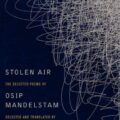A Mind of Winter: Notes on Exile

“My country cannot be found” the narrator announces in “Dancing in Odessa,” the title poem of a collection by the Russian-born American poet Ilya Kaminsky, published in 2004. “All that is musical in us is memory,” we read a few poems later, this time conjuring his mother’s voice. For Kaminsky, language conjures memory, and memory creates a country for the exiled and otherwise displaced.
In “Travelling Musicians,” the penultimate section of Kaminsky’s collection, we encounter a prose sketch of a certain Paul Celan. This Paul Celan, a figure of the poet’s imagination, sits on a rooftop, searching for Venus “reciting Brodsky to himself.” This figure, the Paul Celan of the poet’s imagination, not of history, wonders whether “his past existed at all.” In reciting Brodsky, a Russian poet who began to write poetry decades after the death of the historical Celan, the Celan of Kaminsky’s poem discovers his vocation. The figures who populate Kaminsky’s poems are displaced from history in the same way that Kaminsky is displaced from the land of his birth.
The country of the poet’s language is wide. As broad as the sky itself, it has no territory. “I was born in the city named after Odysseus / and I praise no nation,” says the poet in the concluding poem. Dancing in Odessa is about dancing, and wandering. The poet’s muse is Mnemosyne, wife of Zeus, who gave birth to the nine muses. Her maternity is proof of the productive role of memory in shaping our identities. Like many of the greatest American poets, Kaminsky is an immigrant, and a refugee. He finds his country in language. That language, an English that incorporates many features of Russian as well as fragments from world poetry, reconciles him to his distance from the Odessa of his birth.
Being an immigrant can be defeating and demeaning. Everything you thought you knew you have to learn all over again, as every immigrant knows. Yet, watching the poet reconstruct his country in words is a consolation to all of us who have been severed from the lands of our birth. To be estranged from our countries is to be estranged from some version of our selves. To remember is to refashion that absence into new selves. While Kaminsky dwells on scenes from his childhood to construct a new country from language, other writers exiled from their homeland have built their countries from other poems, other figures of speech, and other ways of inhabiting the planet. These are strategies that I, along with my fellow wanderers, have devised to create a mobile home as we traverse the globe.
Around the time of the Arab Spring, it became apparent to me that I would never return to the land of my birth. I would visit, certainly, but never live there again. Since I never managed to create a home for myself in the United States, the country of my birth, this did not strike me as a great tragedy. By the time that I understood that I would never return, I had just left Syria in order to take up a fellowship in Berlin. A peripatetic academic will move anywhere for a reasonable job. I was beginning a career as an academic, and most jobs were abroad. I didn’t mind: I had never felt at home in the country of my birth. I had never felt American. I was eager to see the world. From my apartment, perched high above Berlin’s Tiergarten, I watched on TV as Egyptians toppled the US-backed Mubarak dynasty, ushering in a new historical era.
My year in Berlin was followed by a year in Bethlehem. That was followed by a year in Singapore and then Budapest. Each of these sojourns left its mark. Berlin gave birth to poetry, but only a decade later. Living in Bethlehem, amid the Israeli occupation, gave birth to a political consciousness in connection with Palestine, which would land me in the crosshairs of a major political conflict in the UK six years later. Singapore was perhaps the most monochromatic of my various transient habitations, but my experience of designing a world literature curriculum at Yale-NUS College in 2014 enabled me to see the migrations of the texts I love in new ways.
I still follow the peripatetic trajectories of my best students from that year, including a brilliant reader of Baudelaire who now works in a museum in Japan, and a lover of Walter Benjamin who is pursuing his PhD in physics at Harvard.
The most permanent migration of my adult life was to London, to a country that has become the closest to what I might call home, and from where I write these notes now. Throughout these migratory years, my homeland gradually receded from view. I applied for jobs in the United States—I applied for jobs everywhere—but every year I did so with waning enthusiasm, a part of me hoping for automatic rejection by the country of my birth. Gradually, I came to feel more at home in Europe than America.
My adult migrations were preceded by coerced migrations during my childhood. These disrupted my emotional attachments and my sense of belonging. From Illinois, where I was born, we moved to New Orleans, Florida, Washington DC, Costa Rica, and Oaxaca, Mexico—all before I became a teenager. I did not speak Spanish when we arrived in Central America, but I learned quickly to pretend.
“Were your parents in the military?” I was asked whenever I recounted the migratory pathways of my childhood. Being a child migrant stood in need of explanation to others, but for me it was simply the architecture of my existence. Once my family finally settled down in California, I became a chronic teenage runaway, to the terror of my parents. I was unable to imagine any other way of being. Perhaps, my migratory childhood had made me restless and impatient. I had grown used to being always on the run. By the age of forty, I had long become acclimated to a life of exile.
Exile is an aberrant experience for many, but it is commonplace in my line of work, just as it was a taken-for-granted aspect of my childhood. In the world I inhabit, exile is a norm. All modernist literature is exilic in one way or another. American modernism was forged in Paris before and after the First World War. Arabic modernism was born during these same years in New York City, among poets who had migrated there from the Levant. Iranian modernism is unthinkable without the combined influences of Tbilisi and Istanbul, London and Berlin.
Like many who survive off the fruits of their intellects, academics do not get to choose their homes. Trying to find work in the land of one’s birth may mean unemployment. Nonetheless, some academics restrict the location for their job search in order to remain close to their family. The one time I applied for a position near my immediate family, in Oregon, I came to regret it. I was shortlisted, and had to undergo the agony of my mother’s disappointment when the position wasn’t offered to me. That was the last time I shared details about my job search with my family: I could not bear to let them down.
Throughout my migratory existence, a small number of poets and critics have become my perpetual companions. Edward Said is foremost among them. I encountered his landmark essay “Reflections on Exile” (1984) in his collection of the same name at the very moment when I embarked on my PhD. Every time I read the essay, it provides a new justification for my life choices, as well as an diagnosis of my existential compulsion to migrate.
Amid my many exiles, I have consoled myself that my distance from my homeland has liberated me emotionally and spiritually from the prejudices of the land of my birth. There are perhaps only two things I truly love about America: rock music and African-American literature. Luckily, both of these can be enjoyed from a distance. As for the rest—hotdogs, genetically modified produce, SUVs, extreme income inequality, the prison-industrial complex, the death penalty, chronic violence and the right to bear arms—none of these are necessary for my existence.
All too often, Americans are unaware of their geographic prejudices. Many are too ignorant of the outside world for my taste. Geographically vast, intellectually America is provincial. Such negative thoughts quelled my spiritual homelessness as I roamed countries and continents in search of a home to replace the one I’d spurned.
I was brought to reflect on my experience by a friend who had recently migrated to the UK. He told me that he was alienated from his past self, yet unable to find himself in his new environment. He was compelled to create in a language not his own, even while the potential of his native language remained dormant. Edward Said diagnosed this state of being well. “For most exiles,” Said writes, “the difficulty consists not simply in being forced to live away from home, but rather…in living with the many reminders that you are in exile…and that the normal traffic of everyday contemporary life keeps you in tantalizing and unfulfilled touch with the old place.” In the contemporary world, being in exile is less like being banished to a foreign land than it is like existing on a threshold, neither wholly at home in the new culture nor wholly severed from the old one.
My friend despaired of ever being able to create amid such estrangement, or even to be himself. The person who he was, he worried, had been left behind in his homeland. He could not find or make a new self in this temporary abode.
I tried to persuade him that his condition was less aberrant than he thought. In my world, and in the history of the literatures that have formed me, the condition of the exilic writer is the norm, not the exception. The artist’s relationship to reality is paradigmatically that of the exile, a point already intuited in the twelfth century by the monk Hugh of Saint-Victor, in his Didascalicon, an encyclopaedic handbook that was used to instruct students in the sciences of rhetoric, philosophy, and exegesis.
In words famously reinterpreted by Edward Said in his 1984 essay on exile, Hugo discusses exile as a metaphor for the ascetic’s quest for spiritual enlightenment. “The man who finds his homeland sweet is still a tender beginner,” he writes. At the next level, “he to whom every soil is as his native one is already strong.” For the perfect seeker of truth, “the entire world is as a foreign land.” Hugo explains these different levels of enlightenment according to the same tripartite schema: “The tender soul has fixed his love on one spot in the world; the strong man has extended his love to all places; the perfect man has extinguished his.”
According to my friend, my American citizenship gave me a relationship to exile very different from his own. The celebration of rootlessness, and of indifference to the world that lies at the heart of Hugh of Saint-Victor’s typology of exile eluded him, and not only because his relationship to his home country was different from my own. Also different was his county’s relationship to the world, and the world’s relationship to that country.
At the end of his essay, Said introduces a poem that perfectly exemplifies his ideal of alienation from one’s native soil: Wallace Stevens’ “The Snow Man” (1921). In this enigmatic poem, which is not explicitly about exile but becomes an allegory of the exilic condition in Said’s reading, Stevens calls on viewers to stop anthropomorphizing objects in the natural world, to cease expecting the outside world to reflect our inner turmoil, and to behold the serene indifference of the snow as the miracle that it is. An earlier generation of Romantic poets and readers projected their misery onto the “sound of the wind, / In the sound of a few leaves” when they gazed on a wintry landscape. Stevens proposes a different way of seeing, of listening, and of being. The poem concludes with a paradox that also articulates the strange position of the exile:
For the listener, who listens in the snow,
And, nothing himself, beholds
Nothing that is not there and the nothing that is.
Said brilliantly discerned in Stevens’ words a modality of experience specific to exile. He turns Stevens’ poem into a template for the exilic imagination. Like a passer-by listening to the crunch of the snow who, instead of projecting his emotions onto the wintry landscape, beholds the “nothing that is not there and the nothing that is,” migrants learn to view the world from a distance. Exile has taught me that this distance, while sometimes painful and always disorienting, confers unique advantages on the viewer.
Following the example of Edward Said, the mind of winter is a state of being, not unlike Gramsci’s “optimism of the will; pessimism of the intellect” that enabled him to gaze on the world’s tragedies without despair from his prison cell. Stevens’ snow man is as alien to the world as the “gold-feathered bird” who dangles down from the “palm at the end of the mind” in “Of Mere Being” (1967). Like the snowman, the bird is serenely indifferent to the world and its woes, and that indifference is what makes it sublime. The bird’s ability to sing “without human meaning, / Without human feeling, a foreign song” is a reverie of the exilic imagination.
The exile who is forcibly severed from her homeland is plagued by her lack of agency in the shaping of her destiny. She did not expect to die in a foreign land, yet that is what life has in store for her. For such creatures of fate, the ability to acquire a mind of winter is a supreme—if bittersweet—assertion of the will. And the ability to articulate this state of being is the purest vindication of the poetry of exile, which is the language of home viewed from a distance, inverted, and made alien to one’s self. In this estranged guise, the language of home sometimes becomes more beautiful in exile.
In The Book of Disquiet, Fernando Pessoa famously described his only “nation,” as the Portuguese language. “This is the only kind of nationalism worth having,” my friend said when I shared Pessoa’s words with him. Portuguese for Pessoa was a portable home, that could be shaped and reshaped from anywhere on earth.
Alienation from the self is exactly the condition of being captured in “The Snow Man.” In the poem, we first encounter a vision that is cold and apparently indifferent to the many layers of suffering that the poet evokes. The snow man—or the passer by who feels like a snow man—beholds “the junipers shagged with ice” and “The spruces rough in the distant glitter,” and yet feels numb. Such is the state of the migrant, who acquires a mind of winter. On one level, this mind is characterized by indifference; viewed from another angle, the indifference is mark of fortitude. On a superficial level, the exile does not “think / Of any misery in the sound of the wind.” On a deeper level, the exile’s entire life is circumscribed by this misery, and the only reason why she does not think about it is that it is everywhere, a perpetual staccato to her everyday existence, as taken for granted as breathing.
In the condition of exile, Said notes, “the pathos of summer and autumn as much as the potential of spring are nearby but unobtainable.” The migrant must cultivate a mind of winter in order to move from place to place. The exile must learn to say goodbye without being immobilized with regret, and in order to pursue something bigger and more permanent than her earthly existence, without giving into despair.
About Rebecca Ruth Gould
Rebecca Ruth Gould is the author of the award-winning monograph Writers and Rebels: The Literature of Insurgency in the Caucasus (2016), and co-editor of The Routledge Handbook of Translation and Activism (2020). She is Professor, Islamic World & Comparative Literature, at the University of Birmingham.





